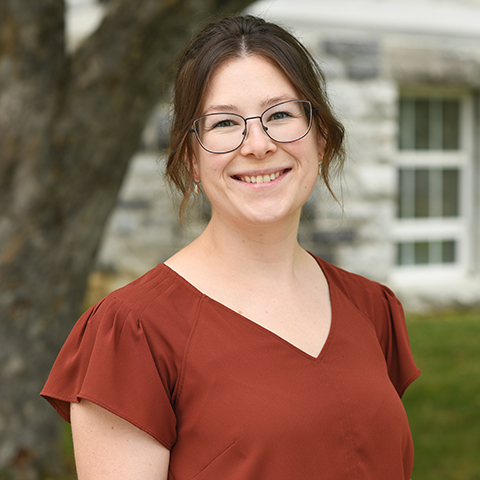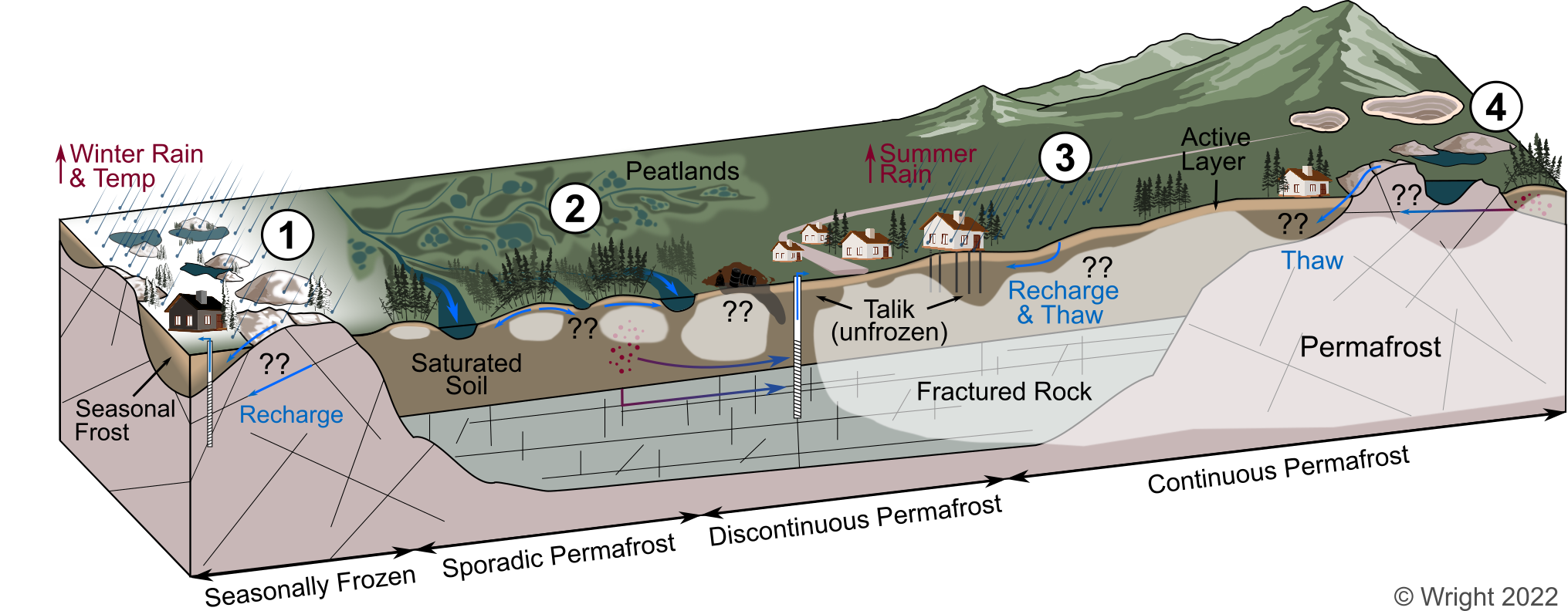
My research projects help to address the following UN Sustainable Development Goals:
I am a new faculty member in the Department of Civil Engineering with a background in environmental and geological engineering. My expertise is in fractured rock hydrogeology, cryo-hydrogeology, and environmental/isotope tracers. The goal of my research is to support safe and sustainable groundwater resources in cold regions under climate change through field-based investigations combined with robust statistical and numerical analyses. My work aims to improve the ability of governments, industry, and First Nations to effectively respond to a rapidly warming climate. I am also an Associate Editor for Hydrogeology Journal and have been on the board of a non-profit organization focused on watershed conservation and outreach since 2017.
I was previously an NSERC Postdoctoral Fellow at Wilfrid Laurier University (2021 – 2022) where I studied the impacts of permafrost thaw on groundwater and surface water integration at the Scotty Creek Research Station. I completed my PhD in Civil Engineering (2016 – 2021) and BASc in Geological Engineering (2012 – 2016) at Queen’s University, Canada.
Rising temperatures from climate change are severely impacting the global cryosphere with direct implications for vital groundwater resources. In seasonally frozen environments, changing winter conditions affect sensitive groundwater resources that are recharged by winter precipitation. In the Circumpolar North, rapid warming is leading to unprecedented permafrost thaw, which is impacting freshwater quality and quantity, damaging critical infrastructure, increasing greenhouse gas emissions, and negatively impacting northern livelihoods. These issues will likely intensify over the coming decades, highlighting the urgent need to understand the processes and trajectory of hydrologic change driven by climate change and permafrost thaw.
The goal of our research is to support safe and sustainable groundwater resources in cold regions under climate change. We conduct process-based field and numerical modelling investigations to understand the impacts of climate change and permafrost thaw on groundwater resources. This work aims to improve predictions of hydrologic change under future climate scenarios and build the capacity of governments, First Nations, and industry to effectively mitigate and adapt to the consequences of a warming world. We take an integrated approach by investigating dynamically coupled systems and incorporate community concerns and Traditional Knowledge into the planning, collection, and interpretation of results. Our research spans cold regions across Canada from seasonally frozen bedrock aquifers in southern Canada, to the permafrost beneath peatlands, tundra, and fractured rock of the Canadian Arctic and sub-Arctic. Some examples of areas we research are highlighted below.

|
|
Nearest Community: Tamworth, Ontario Ongoing Research:
|
|
|
Nearest Community: Whatì, Northwest Territories Ongoing Research:
|
|
|
Nearest Community: Fort Simpson, Northwest Territories Ongoing Research:
|
|
Cape Bounty Arctic Watershed Observatory
|
Nearest Community: Resolute Bay, Nunavut Ongoing Research:
|
CIVL 200: Professional Skills I (2020, 2024)
CIVL 371: Groundwater Engineering (2023, 2024)
Click below for a complete update-to-date list of publications:
Select Publications
|
2025-2028 |
Fire, Fish, Lakes, and Landscapes: The impact of climate on aquatic ecosystems in Tlicho lands (Co-PI), Weston Family Foundation’s Northern Biodiversity Research Program |
|
2024-2027 |
Climate change, dewatering in Ni’iinlii Njik, and Porcupine River chum salmon (Co-PI), CIRNAC – Indigenous Community Based Climate Monitoring Program |
|
2024-2029 |
The Fractured Rock and Cryo-Hydrogeology Laboratory (PI), Canada Foundation for Innovation (CFI) John R. Evans Leaders Fund |
|
2024-2029 |
Advancing Fractured Rock Cryo-Hydrogeology Under Climate Change (PI), NSERC Discovery, Northern Research Supplement, and Discovery Launch Supplement |
|
2024-2027 |
Impact of climate change and permafrost thaw on groundwater vulnerability in northern communities (PI), NSERC Alliance Advantage & Government of the Northwest Territories (GNWT) |
|
2024-2027 |
Impacts of climate change and permafrost thaw on the Whatì community well: A groundwater vulnerability assessment (PI), CIRNAC – Climate Change Preparedness in the North |
|
2024-2027 |
Impacts of wildfire on hydrological connectivity and downstream water chemistry in a region with rapid permafrost loss (Co-PI), GNWT Cumulative Impacts Monitoring Program (CIMP) |
|
2023-2026 |
The Role of Petroleum Hydrocarbons and Salts in Intensifying Thaw and Contaminant Migration for Drilling-Mud Sumps in Warming Permafrost (Co-PI), Imperial Research Grant |
|
2022-2025 |
NWT Streams and Rivers of the future: How permafrost thaw and groundwater activation are changing water resources (PI), GNWT CIMP |
|
2021 |
NSERC Postdoctoral Fellow |
|
Rachel Lackey (PhD Candidate)
|
Rachel is a PhD student co-supervised by Dr. Jeffrey McKenzie at McGill University. Through field work and numerical modelling, she is exploring the impacts of climate change on groundwater vulnerability in discontinuous permafrost environments. She is working towards developing a greater understanding of how groundwater-permafrost thaw feedback occurs and its impact on communities and the greater northern ecosystem. |
|
Abbi Baran (MASc Candidate)
|
Abbi is an MASc student co-supervised by Dr. Élise Devoie who is developing a hydrological model for the La Martre River watershed in the central Northwest Territories using field data she collected over two summers. Her project aims to explore how climate warming, permafrost thaw, and wildfire-induced land cover changes impact hydro(geo)logical connectivity in a fractured bedrock, discontinuous permafrost watershed.
|
|
Ava Bebbington (MASc Candidate)
|
Ava is an MASc student co-supervised by Dr. Cole Van De Ven at Carleton University. Ava is studying the interactions between permafrost thaw and contaminants stored in drilling-mud sumps in the Arctic, which are used for the underground disposal of waste from exploratory oil drilling operations. This includes laboratory experiments examining how freeze-thaw cycles affect contaminant transport, how contaminants affect permafrost thermal properties, and how future climate scenarios could affect existing sumps.
|
|
Reimy Mulligan (BASc Student)
|
Reimy is a fourth year student studying Geological Engineering at Queen’s University. As part of his summer work term and undergraduate thesis, he is studying subsurface contaminant transport in thawing permafrost settings by conducting dye tracer experiments at Cape Bounty in the Canadian High Arctic, and through numerical modelling. |
|
Taeya Carl (BASc Student)
|
Taeya is a fourth-year student in Civil Engineering completing a thesis on groundwater vulnerability and impacts to water quality from thawing permafrost. She is examining spatial and temporal water quality data from the community of Whatì, who are one of three communities in the Northwest Territories dependent on groundwater. |
|
Lydia Morrow (BSc Student) |
Lydia is a fourth-year student in the Department of Geography and Planning and is working in Dr. Wright's group as a research assistant. Her project looks at the pre- and post-wildfire impacts to water quality in thawing permaforst peatlands in the southern Northwest Territories. Her study site is the Scotty Creek Research Station, which was impacted by wildfire in 2022 and is the first Indigenous-led research station in Canada. |
Dr. Wright is actively seeking talented and driven students for fully funded masters and PhD projects on topics related to groundwater flow and contaminant transport in cold regions. All projects have varying degrees of field investigation and/or numerical modelling. Other topics related to cold regions groundwater resources are possible, so reach out if you have a project/topic in mind!
|
PhD Project #1 |
Climate and Wildfire Impacts on Lake Hydrology in the Northwest Territories, Canada Click here for more application details In partnership with the Tłı̨chǫ Government and local communities, this project will address key knowledge gaps surrounding fish habitat by filling critical data gaps on water quality, hydrology, and lake history in the Tłı̨chǫ region, while evaluating the cumulative impacts of climate change on food-webs and fish response. This PhD student will be responsible for quantifying groundwater inputs (flow, nutrients, contaminants) into two study lakes which represent burned and unburned lakes on the landscape. This data will be used by collaborators to generate 3D numerical models of the lakes to simulate changes in water quality and fish habitat. New knowledge of the impacts of climate change on northern ecosystems will inform future projects, monitoring, and policy development to support biodiversity in Tłı̨chǫ lands and across the NWT.
|
|
MASc Project #1 |
Impacts of permafrost thaw and climate change on groundwater flows in Ni’iinlii Njik (Fishing Branch River), Yukon and implications for chum spawning habitiat. This project is partnered with Vuntut Gwitchin First Nation (VGFN) who are concerned that changing groundwater and permafrost conditions of in Ni’iinlii Njik are increasing the extent of late winter dewatering (drying), leading to a loss of salmon populations that are critical to the region’s traditional activities and economy. The project will apply both scientific and traditional approaches to determine how ground and surface water flows in this fractured rock catchment are changing, how this could be causing river dewatering, and what climate or environmental factors are driving this change. |
|
MASc or PhD Project #2 |
Assessing groundwater vulnerability to permafrost thaw and geogenic contaminant mobilization in Whatì, NWT. The community of Whatì is one of three communities in the Northwest Territories that depend on groundwater for their drinking water supply. In partnership with the Community government of Whatì and the Government of the Northwest Territories, this project will identify sources of geogenic contaminants and how contaminants could impact the community water supply as permafrost thaws. This includes sources of metals from the underlying fractured rock aquifer, and from the surrounding permafrost peatlands that may contain high levels of mercury and methyl mercury. |
Applicants should have an undergraduate or masters degree in Civil, Environmental, or Geological Engineering, Earth and Environmental Sciences, Physical Geography, or related fields. Previous related field experience is an asset, but is not essential. Additionally, applicants for Northern field projects should be eager and interested in engaging with Indigenous communities and conducting field work in remote locations for extended periods (e.g., several weeks) at a time.
To apply, include a cover letter outlining your relevant experience and position(s) you are interested in, an updated CV, and unofficial transcripts. Please email your application to Dr. Wright (stephanie.wright@queenu.ca) with the subject line “Wright Research Opportunity - Position #”
Applications will continue to be accepted until a suitable cadidate is found. Positions will be removed from this page as they are filled.